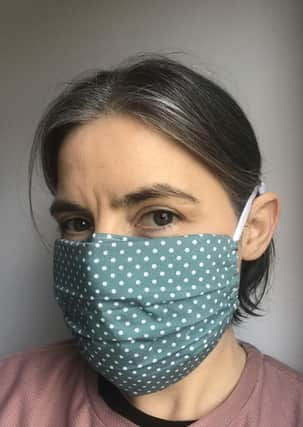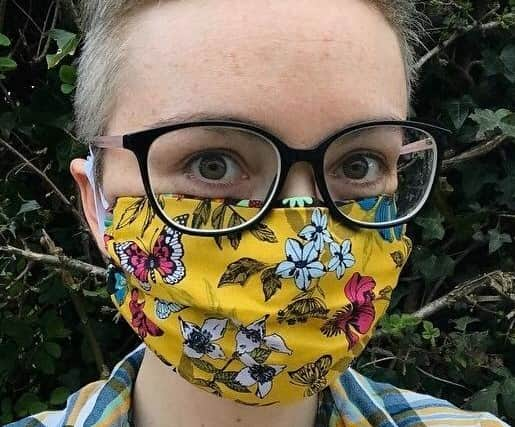Coronavirus: Army of volunteers across Northern Ireland making masks for those on Covid-19 frontline


All across Northern Ireland people are switching on sewing machines and picking up a needle and thread to create homemade masks for healthcare workers facing shortages amid the coronavirus pandemic.
Crafty volunteers have formed online sewing groups, where they share patterns they think can best address the needs of medical workers.
Advertisement
Hide AdAdvertisement
Hide AdUsing their sewing machines and piles of fabric, they work to make as many masks as they can to help hospitals, community groups and care homes in need of more supplies.


One of those groups is Covid-19 Cloth Face Masks for All Ireland, which was set up on March 23 by Mary Murphy and some friends to provide homemade masks for those working and volunteering among the vulnerable.
It’s a big change for Mary, who just a couple of weeks ago ran a successful business making beautiful, bespoke items for her company, Sioda Lingerie.
The 41-year-old, who lives in Magherafelt, made supportwear for brides, but then Coronavirus happened, weddings were cancelled and Mary’s order book, like too many others’, dried up.
Advertisement
Hide AdAdvertisement
Hide AdBut the mum-of-two, who has been sewing from the age of eight, knew she could use her skills to good effect, making protective masks for those healthcare workers on the frontline.
Since its recent inception, the group has grown to include 2,300 members across Ireland and globally, and there’s an army of some 340 sewers with currently enough fabric to make up to 8,000 masks.
‘‘It’s basically socks for soldiers,’’ said Mary, who is originally from Wicklow.
‘‘The soldiers couldn’t survive in the war without socks and so the women knitted them.
Advertisement
Hide AdAdvertisement
Hide Ad‘‘This is a really simple thing that we have the skills to do and will make a huge difference in the likes of care homes and nursing homes.’’
She described the group as ‘‘a nation-wide factory’’ that is making a protective product, the best it possibly can, in lockdown.
The crowdsourced group of voluntary sewists make reusable cotton face masks, which can be boil washed every day, but Mary, who has a Masters in Aeronautical Engineering, is at pains to point out the masks will never be as good as a surgical mask, and are not a replacement for them.
‘‘Surgical masks are the preferred but they are in very limited supply. A surgical mask is capable of filtering out 80% of particles down to as tiny as 0.007 microns, A cloth mask can offer 50% of a filter.
Advertisement
Hide AdAdvertisement
Hide Ad‘‘In the space where there is nothing, these are something for those who are putting themselves at risk to help us.’’
The masks are free to those who need them and the group uses a single, standardised pattern.
Mary added: ‘‘For a mask to be the best it can, it needs to be 100 per cent cotton, it needs to have a pocket for a filter, it needs to be disposable and have an easily accessible filter that everybody can access - and that is kitchen roll. There’s research to show that kitchen roll is effective and you can put multiple layers of it in.’’
The material costs of the group’s work are supported by both material donations and its Go Fund Me appeal, but it needs more help.
Advertisement
Hide AdAdvertisement
Hide Ad‘‘We have issues with distribution, funding and fabric. People are locked down in their homes as well, so this is not easy to co-ordinate, it’s not easy to fund and then there’s that whole high-level mixed message about masks,’’ said Mary.
But the camaraderie among the group is what keeps them all going.
‘‘They are an amazing group of supportive people, who support me and support each other.
‘‘The people who are sewing are vulnerable themselves. There are ones withing the group that are working full-time and sewing, there are ones who are off with stress and have mental health issues, but the heart of the group is in people who care.’’
Advertisement
Hide AdAdvertisement
Hide AdEdel Ni Ghribin, 32, from Coalisland sews and helps out with the group’s admin.
‘‘I am a hobby sewist and use sewing as a way to help my mental health. I am unemployed due to medical reasons.
‘‘I saw the news and realised the need for a properly adapted mask to help stop the spread of the virus. For me, I see the most need being for staff in supermarkets, residents in nursing homes, and those in our community who are still working everyday as a key worker at this time.
‘‘I joined the group when there were only 200 members as I felt making the mask was something easy I could do during this lockdown to help those in need, while also using the time spent sewing to help with my own mental health.’’
Advertisement
Hide AdAdvertisement
Hide AdEdel added: ‘‘A week after I joined the group the membership numbers rocketed and the message about wearing masks was spreading fast - almost as fast as the corona virus itself.
‘‘We now have over 2,300 members, including from countries such as Germany, Canada and New Zealand where people have seen what we are doing here and want to set up their own version in their country. The world is now watching us.’’
Edel publishes two videos a week to help people understand the pattern.
‘‘We have a variety of skill levels in the group - from people who have bought a sewing machine just to be able to help us, to expert sewists who work in the fashion industry.’’
Advertisement
Hide AdAdvertisement
Hide AdBut she reiterated: ‘‘We need more people to join us and sew masks. We need more funding to buy properly sourced materials. We need help to help those who need it the most.’’
Up until a few weeks ago Kelly Black, 41, from Newtownabbey was busy running own dressmaking business, but, like Mary, her work dried up when weddings were cancelled.
‘‘One of my brides is a nurse so I contacted her to see if the cloth masks could be used. Her mum is an area manager for some care homes, so she said she could use them as she couldn’t get masks for her staff. So she placed an order for 400.’’
Mum-of-three Kelly said sewing takes her away from all her worries.
Advertisement
Hide AdAdvertisement
Hide Ad‘‘When I sew it’s like I’m in another world. The other day I went to my studio and did four hours. I work on my own so I’m not in contact with anybody, so it’s very safe. It was nice for me to get out of the house.
‘‘My husband is an electrician, his sites are closed, so he’s at home, so you can imagine what our house is like with all of us stuck in it.
‘‘I have my conservatory set up like a sewing room. I go in there for an hour at night or during the day. For me to be able to escape for a few hours and get a lot of the masks done, it’s just lovely.’’
*To get involved with Covid-19 Cloth Masks for All Ireland or make a donation, visit their Facebook page.
A message from the Editor:
Advertisement
Hide AdAdvertisement
Hide AdThank you for reading this story on our website. While I have your attention, I also have an important request to make of you.
With the coronavirus lockdown having a major impact on many of our advertisers - and consequently the revenue we receive - we are more reliant than ever on you taking out a digital subscription.
Subscribe to newsletter.co.uk and enjoy unlimited access to the best Northern Ireland and UK news and information online and on our app. With a digital subscription, you can read more than 5 articles, see fewer ads, enjoy faster load times, and get access to exclusive newsletters and content. Visit https://www.newsletter.co.uk/subscriptions now to sign up.
Our journalism costs money and we rely on advertising, print and digital revenues to help to support them. By supporting us, we are able to support you in providing trusted, fact-checked content for this website.
Alistair Bushe
Editor